 Saya's Honors Portfolio Saya's Honors Portfolio  http://sayamadeaportfolio.neocities.org http://sayamadeaportfolio.neocities.org 
|
.png)
 Redefining Success
Redefining Success HONORS 100 Reflection: Freshman Year me was a Liar (AU21)
HONORS 100 Reflection: Freshman Year me was a Liar (AU21)
Moreover, my reflection doesn't mention any of my own academic interests or the sense of personal and intellectual fulfillment I might get by pursuing those interests. To freshman year me, those things were nowhere near as important as external measures of success such as GPA or getting into a competitive major. Overall, this reflection encapsulates the conception of success that I had when I entered UW, which could be boiled down to 1. Get 4.0s in everything and 2. Get into the most selective major possible. Over the course of the next 4 years, I would have many experiences that eventually led to my views on this changing dramatically–which is something that I will always be grateful for.  PSYCH 222 A: Sleep!!! (AU22)
PSYCH 222 A: Sleep!!! (AU22) The topic of the class was sleep, something I knew next to nothing about. While we covered many different aspects of sleep–including sleep disorders, dreams, and the differences in sleep norms across cultures–all of them circled back to the importance of rest for brain function, as well as mental and physical health. As one of the assignments for this class, I completed a sleep diary, in which I kept track of various aspects of my sleep, such as when I went to bed, how I felt in the morning, and more. After seeing my own sleep habits laid out like that, I started to become concerned. I saw that I wasn't sleeping enough, and that it was negatively affecting my mood and my physical health. In fact, I realized that I had been chronically sleep deprived since high school, when I began sacrificing rest for more study time. I didn't think much of it at the time–everyone I knew was doing the same thing. In fact, it wasn't uncommon to hear people brag about how little sleep they got, as if that was a direct measure of how hard they were working. I used to compare myself to the people who said they got four, three, sometimes as little as two hours of sleep every night and feel inferior for being less dedicated to my studies. However, the knowledge that I gained in this class made me realize how dangerous that level of sleep deprivation can be. We learned about the immediate dangers of not getting enough sleep, such as being distracted when driving, as well as the long term consequences, which include higher rates of everything from heart disease to Alzheimer's. Despite this, I wouldn't say that PSYCH 222A single handedly convinced me to prioritize my wellbeing over my academic performance. I was still running on more caffeine and fewer hours of sleep than I should have been. But it did start me on the path of questioning the hustle culture mindset and helped me feel a little less guilty when I slept in instead of getting up at 6 AM to study like everyone on LinkedIn was telling me I should.  Dropping Math 224 (AU22)
Dropping Math 224 (AU22)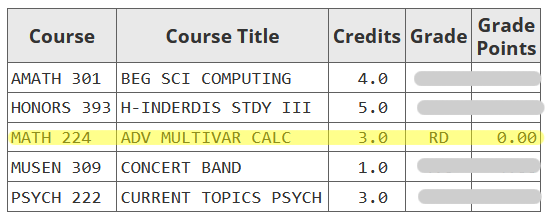 At the beginning of my Sophomore year, I still had vague intentions of majoring in Mathematics. This all changed when I took MATH 224: Calculus IV. I vividly remember sitting in class one day as the professor lectured about using triple integrals to measure the volume of fourth dimensional shapes. It struck me that what we were learning was something that the human brain can hardly even conceptualize–what real world significance could it possibly have? MATH 224 made me realize that I had never been interested in math for its own sake, but as a tool to understand other things. At the same time that I was taking MATH 224, I was also taking AMATH 301–which was, as I'm sure you can guess, far more application-based. These experiences prompted me to speak with an Honors advisor, who encouraged me to pursue the topics that I was interested in instead of forcing myself to go down a path I wasn't sure was right for me. This prompted me to change my intended major from Math to Applied Math.
At the beginning of my Sophomore year, I still had vague intentions of majoring in Mathematics. This all changed when I took MATH 224: Calculus IV. I vividly remember sitting in class one day as the professor lectured about using triple integrals to measure the volume of fourth dimensional shapes. It struck me that what we were learning was something that the human brain can hardly even conceptualize–what real world significance could it possibly have? MATH 224 made me realize that I had never been interested in math for its own sake, but as a tool to understand other things. At the same time that I was taking MATH 224, I was also taking AMATH 301–which was, as I'm sure you can guess, far more application-based. These experiences prompted me to speak with an Honors advisor, who encouraged me to pursue the topics that I was interested in instead of forcing myself to go down a path I wasn't sure was right for me. This prompted me to change my intended major from Math to Applied Math.
While I'm glad I went down the path of majoring in AMATH, looking back I do regret dropping MATH 224. In addition to my changing interests, a big reason why I dropped MATH 224 was because of my grades. I had done very poorly on the midterm just a week before, and I was panicking about how it would ruin my GPA. I now know that an understanding of higher dimensional spaces is foundational to machine learning, and that the skills taught in MATH 224 would have ended up being useful to me. Ultimately, my preoccupation with academic success caused me to make a hasty decision that prevented me from learning things that would have benefitted me in the long run.  AMATH Major Acceptance (SP23)
AMATH Major Acceptance (SP23)
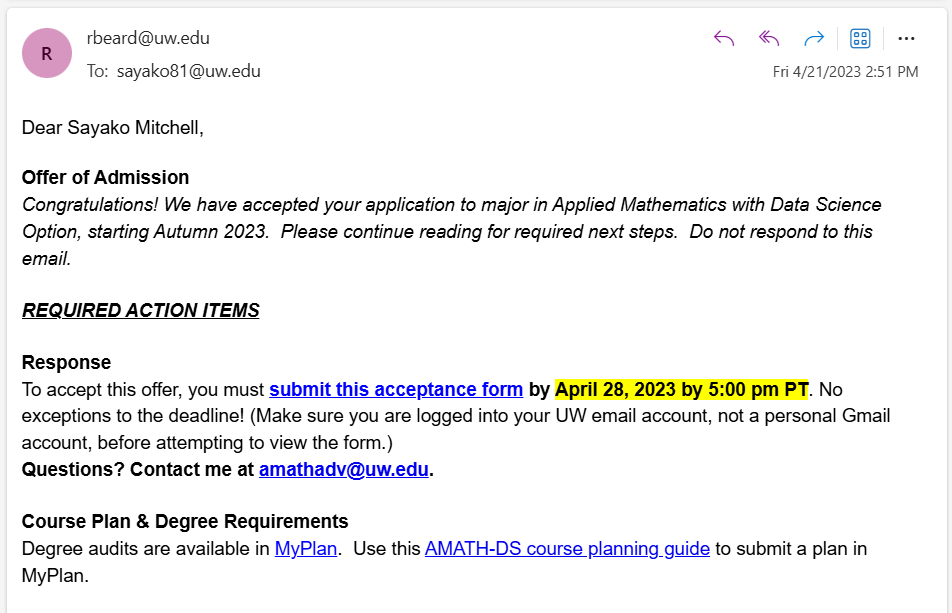 In the spring quarter of my sophomore year, I decided to finally bite the bullet and apply to the AMATH major. This was something I'd been mulling over since I took AMATH 301 that fall. I wanted to study AMATH because it allowed me to see how mathematics could be used in the real world. At least, that's what I told people. And to be fair, it wasn't a lie–I had very much enjoyed learning about the ways in which mathematics can be used to solve different problems in diverse areas. But it wasn't the whole truth either. The other thing that I liked about the major, perhaps even as much as the problem solving aspect, was its selectivity. In the previous admissions cycle, only 15% of applicants had been admitted. Surely, if I made the cut for AMATH, that would signal to everyone that I was smart and capable. With that thought at the forefront of my mind, I applied to the major. Within a few weeks, I got my acceptance email. Instead of feeling the happiness that I expected, I was merely relieved. I felt like I finally had some confirmation that I was doing college "correctly". It makes me sad to think back and see how firmly shackled I was to external definitions of success and worth, but I'm grateful for the opportunities I've had since then to grow past them.
In the spring quarter of my sophomore year, I decided to finally bite the bullet and apply to the AMATH major. This was something I'd been mulling over since I took AMATH 301 that fall. I wanted to study AMATH because it allowed me to see how mathematics could be used in the real world. At least, that's what I told people. And to be fair, it wasn't a lie–I had very much enjoyed learning about the ways in which mathematics can be used to solve different problems in diverse areas. But it wasn't the whole truth either. The other thing that I liked about the major, perhaps even as much as the problem solving aspect, was its selectivity. In the previous admissions cycle, only 15% of applicants had been admitted. Surely, if I made the cut for AMATH, that would signal to everyone that I was smart and capable. With that thought at the forefront of my mind, I applied to the major. Within a few weeks, I got my acceptance email. Instead of feeling the happiness that I expected, I was merely relieved. I felt like I finally had some confirmation that I was doing college "correctly". It makes me sad to think back and see how firmly shackled I was to external definitions of success and worth, but I'm grateful for the opportunities I've had since then to grow past them.
 UW Junior Medal (WI24)
UW Junior Medal (WI24) 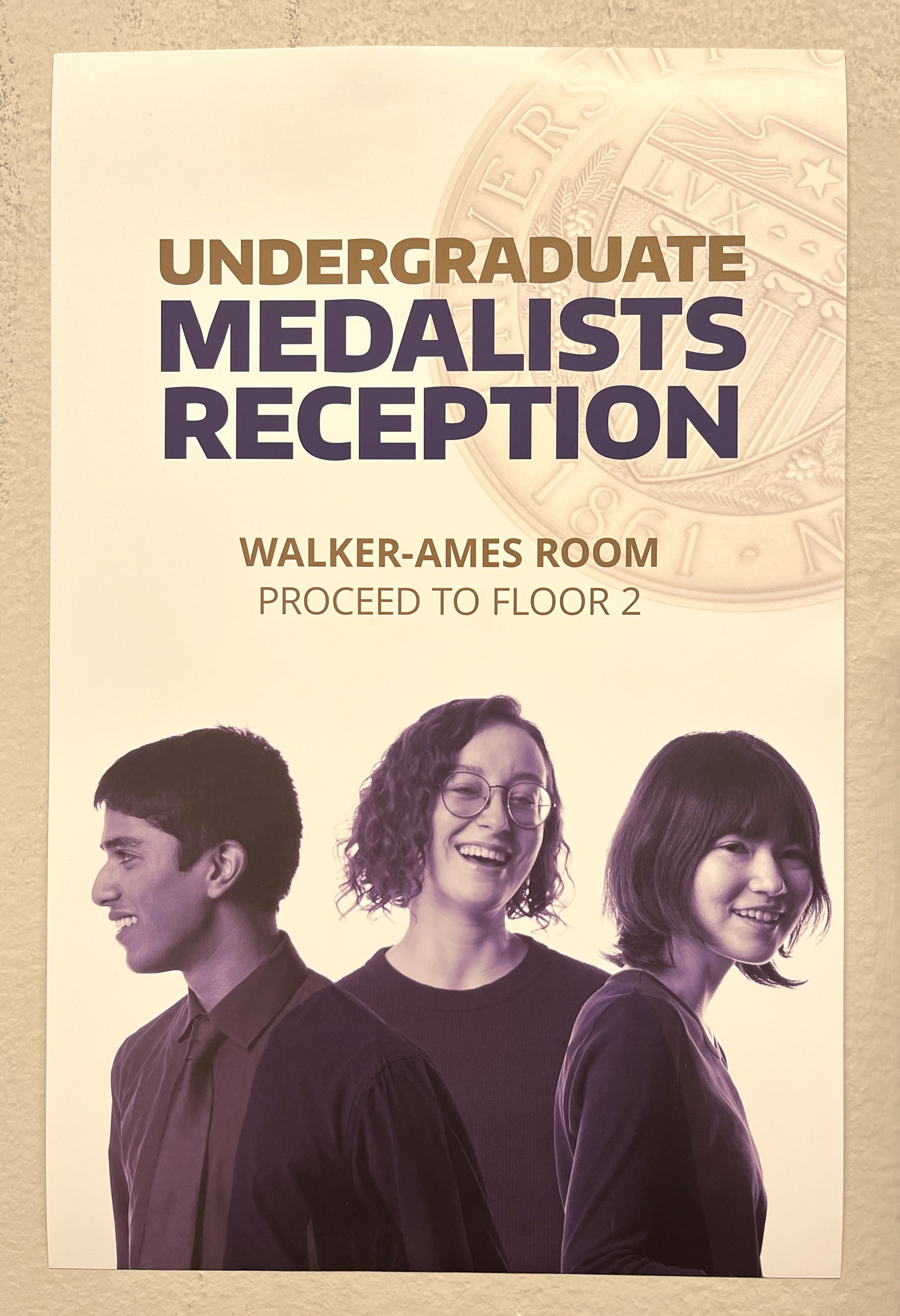 One such opportunity came in my junior year, when I won the President's Medal and Scholarship. This was an incredible honor, and a direct acknowledgement of my academic success. I was happy about it, of course, especially seeing how pleased my parents were. But as soon as the ceremony ended, that feeling faded. Truthfully, the award didn't make me feel like I had accomplished anything of worth. In fact, in some ways, it made me feel like I had wasted the past three years studying and obsessing over my grades when I could have been doing something more meaningful. This made me realize how ridiculous my academic perfectionism was. After this, I began interrogating the way I think about success. What was I actually getting out of destroying my physical and mental health for a few hundredths of a GPA point? Was a number on my transcript really what was most important to me?
One such opportunity came in my junior year, when I won the President's Medal and Scholarship. This was an incredible honor, and a direct acknowledgement of my academic success. I was happy about it, of course, especially seeing how pleased my parents were. But as soon as the ceremony ended, that feeling faded. Truthfully, the award didn't make me feel like I had accomplished anything of worth. In fact, in some ways, it made me feel like I had wasted the past three years studying and obsessing over my grades when I could have been doing something more meaningful. This made me realize how ridiculous my academic perfectionism was. After this, I began interrogating the way I think about success. What was I actually getting out of destroying my physical and mental health for a few hundredths of a GPA point? Was a number on my transcript really what was most important to me?
Eventually, I realized that prioritizing external metrics of success was unsustainable, and I began to try and find ways to measure success that weren't confined to my GPA. Some things that I thought about were community involvement, improvement (as opposed to perfection), and the ever elusive "feeling of purpose". Through this, I've come to see that my pursuit of academic perfection was ultimately self-centered, and that I missed out on making meaningful connections with others because of it. As such, community involvement is something that I want to prioritize and intentionally include in my work going forward.  TXTDS Capstone: Engaging with Community (WI25)
TXTDS Capstone: Engaging with Community (WI25)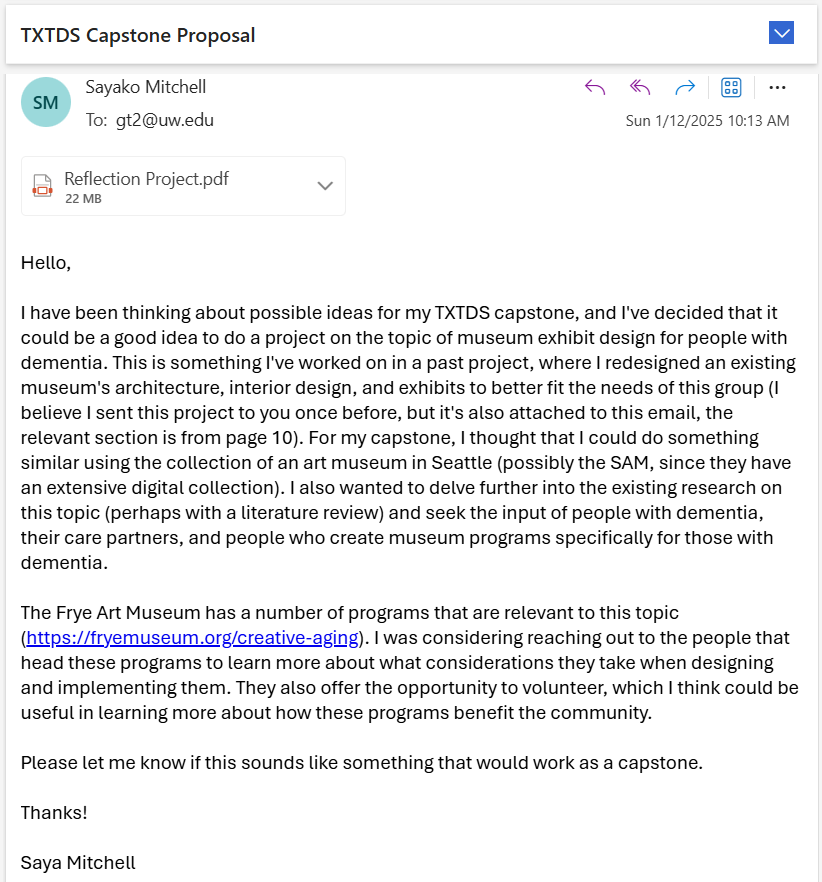 One way in which I intend to engage more with various communities is through my TXTDS capstone. This capstone is a requirement for the Textual and Digital Studies minor. I am currently in the planning stage for my project, which I will complete this upcoming spring quarter. My capstone is a continuation of the final project that I did for my study abroad program. For that project, I redesigned an existing museum to better cater to the needs of various overlooked groups of museumgoers, including children, blind people/people with low vision, and people with dementia. In my capstone, I want to further explore how museums can serve this last group.
One way in which I intend to engage more with various communities is through my TXTDS capstone. This capstone is a requirement for the Textual and Digital Studies minor. I am currently in the planning stage for my project, which I will complete this upcoming spring quarter. My capstone is a continuation of the final project that I did for my study abroad program. For that project, I redesigned an existing museum to better cater to the needs of various overlooked groups of museumgoers, including children, blind people/people with low vision, and people with dementia. In my capstone, I want to further explore how museums can serve this last group.
As part of this, I am planning to volunteer at the Frye Art Museum here in Seattle. The Frye has many programs specifically designed for people with dementia and their care partners, and I know it will be an amazing learning opportunity to assist with these programs and see them in action. I am excited to work directly with this community instead of just writing about them. Not only is using what I've learned at UW to have an actual, tangible impact on the lives of others far more satisfying than getting a good grade, I believe it is a better measure of successful learning as well.  CFRM 410: Learning to Survive Mediocre Grades (SP24)
CFRM 410: Learning to Survive Mediocre Grades (SP24)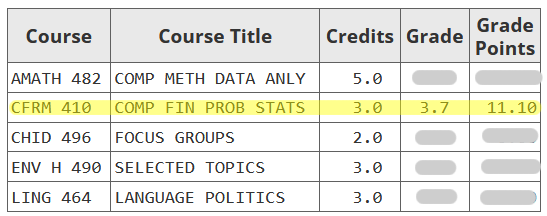 CFRM 410 was my first foray into statistics. It didn't take long for it to become clear to me how different statistics was from the types of math I had learned in the past. My lack of previous experience in this topic began to catch up with me a few weeks into the quarter. I spent hours trying to puzzle through homeworks, rewatching lectures and rereading the professor's notes. Despite putting more effort into this class than I had in any past math class, I still did poorly on the midterm, an unfortunate result of nerves and having misunderstood the topics we were going to be tested on. With my score, I knew there would be no way to salvage a 4.0. Disappointed and embarrassed, I wished I could just stop going to class and pretend that it hadn't happened. Still, this class was a requirement for my major, and I knew I couldn't afford to give up. So I continued going to lectures, and I continued to try learning the material to the best of my ability. Instead of obsessing over my scores, I focused on finding and understanding interesting applications of statistics (One that I still think about often is determining the average length of time spent waiting for the bus if you leave your house at any given time. This problem assumes the bus is always on schedule, which makes it so unrealistic as to be effectively useless, but I still think it's a cool problem!).
CFRM 410 was my first foray into statistics. It didn't take long for it to become clear to me how different statistics was from the types of math I had learned in the past. My lack of previous experience in this topic began to catch up with me a few weeks into the quarter. I spent hours trying to puzzle through homeworks, rewatching lectures and rereading the professor's notes. Despite putting more effort into this class than I had in any past math class, I still did poorly on the midterm, an unfortunate result of nerves and having misunderstood the topics we were going to be tested on. With my score, I knew there would be no way to salvage a 4.0. Disappointed and embarrassed, I wished I could just stop going to class and pretend that it hadn't happened. Still, this class was a requirement for my major, and I knew I couldn't afford to give up. So I continued going to lectures, and I continued to try learning the material to the best of my ability. Instead of obsessing over my scores, I focused on finding and understanding interesting applications of statistics (One that I still think about often is determining the average length of time spent waiting for the bus if you leave your house at any given time. This problem assumes the bus is always on schedule, which makes it so unrealistic as to be effectively useless, but I still think it's a cool problem!).
Ultimately, my final grade in CFRM 410 ended up being my lowest grade at UW. In spite of that, I'm still proud of myself and everything that I learned in this course. My ability to persevere when it got hard, and the way I was able to prioritize learning and cultivating my interest in statistics over my grades show how I had matured as a student from my time in MATH 224.  Declaring "Useless" Minors (AU24)
Declaring "Useless" Minors (AU24)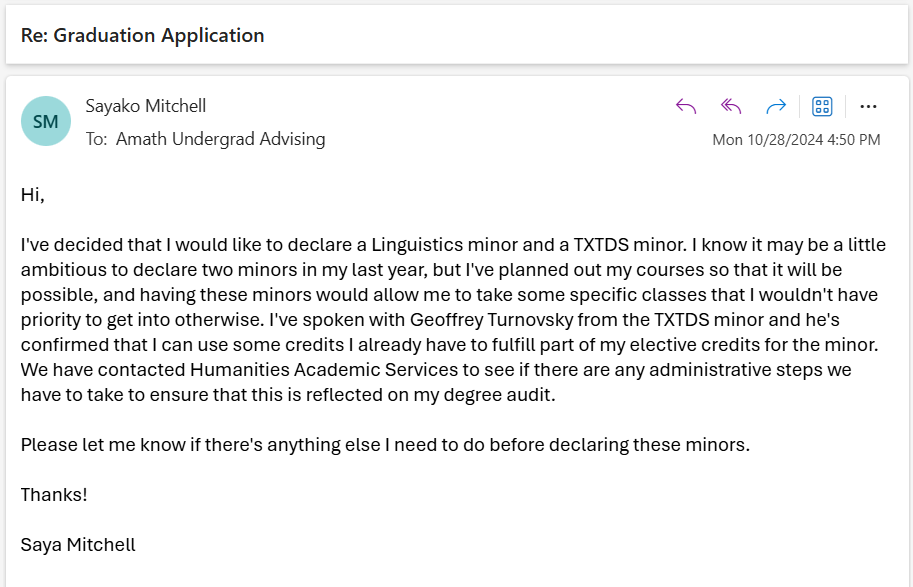
These opinions didn't sway me. I knew that TXTDS and Linguistics weren't useless. Future employers might not care, but I knew I was gaining valuable skills and knowledge through these classes that I could apply to my work in tech. Linguistics classes such as LING 432: Sociolinguistics and LING 462: Language Politics were helping me understand the social dimensions of language, which are often ignored by NLP technologies. TXTDS classes were helping me understand how AI is changing our relationship with information and text reuse. And at the end of the day, I wanted to study these subjects because I liked them. Plain and simple. Unlike when I applied to major in AMATH, I wasn't thinking about how these minors would look to others. I couldn't care less how impressive or not they were. All that mattered was what I thought–and I thought they sounded like a great way to round out my time at UW. My decision to minor in TXTDS and Linguistics exemplify my growth over the past four years. I would have never chosen to study these subjects as a freshman or sophomore, when I was still letting societal definitions of success dictate my actions. Now, as a senior, I have a much better understanding of myself, and I'm able to make decisions based on my own values and interests instead of what others think. 
|
|
|
